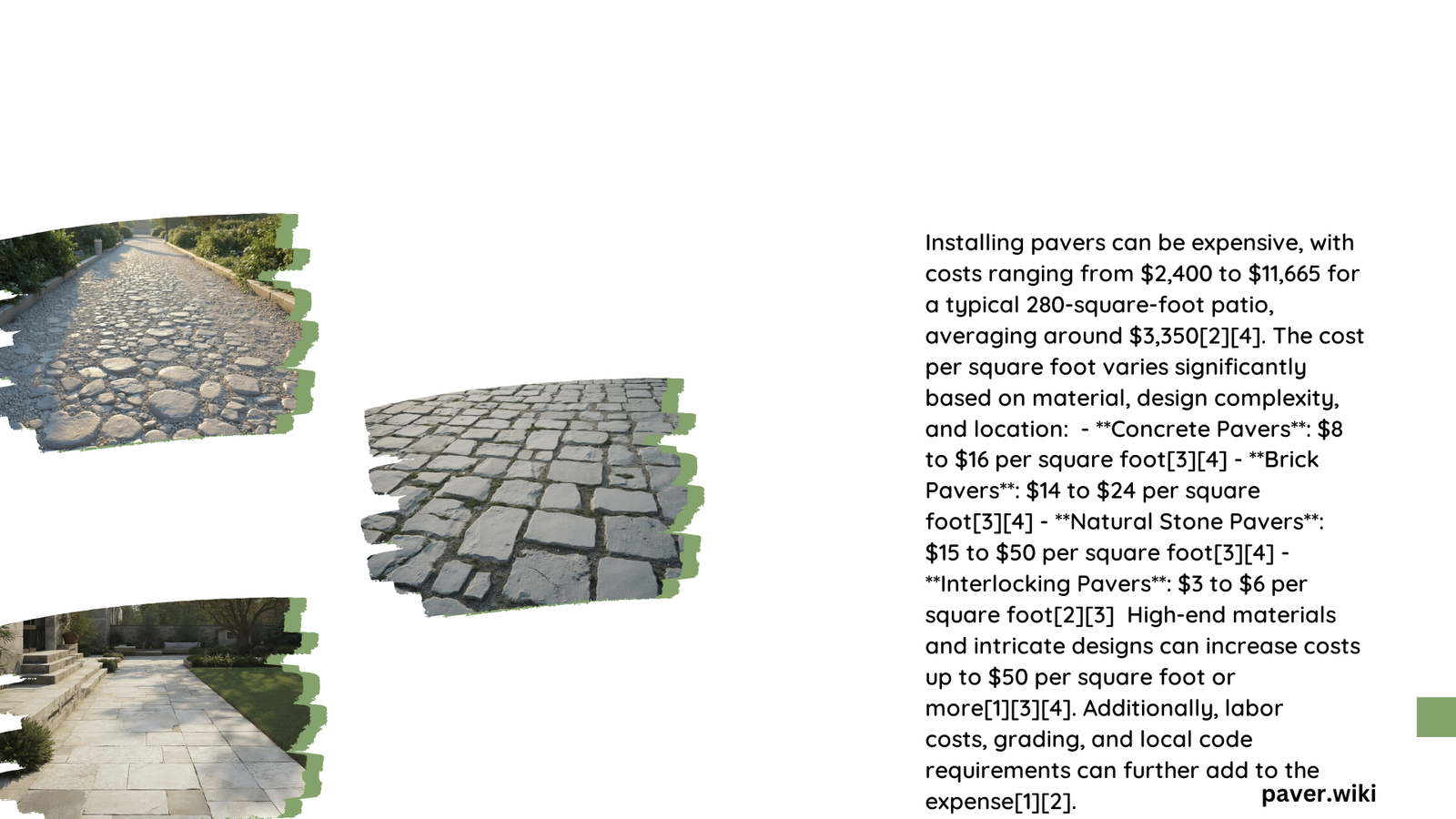Installing pavers can be a significant investment for homeowners and property managers. The cost of paver installation varies widely depending on factors such as material choice, project size, and site conditions. On average, paver installation costs range from $15 to $30 per square foot, with high-end projects potentially reaching $50 per square foot or more. This article explores the various factors that contribute to the expense of putting pavers and provides a detailed breakdown of costs to help you understand whether paver installation is indeed expensive for your specific project.
What Are the Average Costs for Paver Installation?
The cost of paver installation can be broken down into several components:
- Material costs
- Labor expenses
- Site preparation
- Additional fees
Let’s examine each of these in detail:
Material Costs
- Concrete Pavers: $3 to $6 per square foot
- Brick Pavers: $4 to $8 per square foot
- Natural Stone Pavers: $7 to $16 per square foot (high-end options up to $50 per square foot)
Labor Expenses
- Average labor costs: $6 to $11 per square foot
- Hourly rates: $50 to $100 per hour
Site Preparation
- Additional $1 per square foot for basic site prep
- Complex site conditions can increase costs by 10% to 20%
Additional Fees
- Delivery fees
- Cleanup costs
- Equipment rental
- Permits and inspections
Why Do Paver Costs Vary So Much?

The wide range in paver installation costs can be attributed to several factors:
- Material Choice: Natural stone pavers are generally more expensive than concrete or brick pavers.
- Project Size: Larger projects often benefit from economies of scale, resulting in lower per-square-foot costs.
- Site Conditions: Sloped or uneven terrain, poor soil quality, and limited accessibility can all increase installation costs.
- Design Complexity: Intricate patterns or custom designs require more labor and may result in more material waste.
- Geographic Location: Labor and material costs can vary significantly depending on your region.
How Does Project Size Affect Paver Installation Costs?
Project size plays a crucial role in determining the overall cost of paver installation. Here’s a breakdown of how costs can vary based on project size:
| Project Size (sq ft) | Cost per Square Foot | Total Cost Range |
|---|---|---|
| 100-200 | $18-$35 | $1,800-$7,000 |
| 400-500 | $15-$30 | $6,000-$15,000 |
| 1000+ | $12-$25 | $12,000-$25,000+ |
As you can see, larger projects tend to have lower per-square-foot costs due to economies of scale. However, the total project cost increases with size.
What Additional Expenses Should Be Considered?
When budgeting for paver installation, it’s important to account for additional expenses that can add to the overall cost:
- Site Preparation: $1 per square foot or more for complex sites
- Delivery Fees: Around $550 for a 400-square-foot project
- Cleanup Costs: Approximately $255 for a 400-square-foot project
- Equipment Rental: Daily fees for tools like wet masonry saws and plate compactors
- Permits and Inspections: Fees required by local building departments
How Do Seasonal Conditions Impact Paver Installation Costs?
Seasonal factors can significantly affect the cost and timeline of paver installation:
- Peak Season (Summer and Early Fall):
- Higher demand leads to increased labor rates
- Material costs may be higher due to increased demand
-
Faster project completion due to favorable weather conditions
-
Off-Season (Late Fall and Winter):
- Potentially lower labor rates due to decreased demand
- Possible material discounts
- Longer project timelines due to weather-related delays
What Are the Long-Term Cost Implications of Paver Installation?
While the initial cost of paver installation can be substantial, it’s important to consider the long-term financial implications:
- Durability: Properly installed pavers can last 20-30 years or more, reducing long-term replacement costs.
- Maintenance: Pavers generally require less maintenance than other hardscaping options, potentially saving money over time.
- Property Value: Well-designed paver installations can increase property value, providing a return on investment.
- Repair Costs: Individual pavers can be easily replaced if damaged, avoiding the need for large-scale repairs.
Is DIY Paver Installation a Cost-Effective Alternative?
For those looking to reduce costs, DIY paver installation might seem appealing. However, consider the following:
Pros of DIY Installation:
– Potential savings on labor costs
– Personal satisfaction of completing the project
Cons of DIY Installation:
– Risk of improper installation leading to future problems
– Time-consuming process, especially for inexperienced individuals
– Need to purchase or rent specialized tools
– Potential for increased material waste due to inexperience
For most homeowners, professional installation is recommended to ensure a high-quality, long-lasting result.
How Can You Reduce the Cost of Paver Installation?
While paver installation can be expensive, there are ways to manage costs:
- Choose more affordable materials: Opt for concrete pavers instead of natural stone.
- Simplify the design: Complex patterns increase labor costs and material waste.
- Prepare the site yourself: If you’re comfortable with manual labor, you can save on site preparation costs.
- Get multiple quotes: Compare prices from different contractors to ensure you’re getting a fair price.
- Consider timing: Installing pavers during the off-season may result in lower labor costs.
Conclusion: Is It Expensive to Put Pavers?
The cost of paver installation can indeed be substantial, with prices ranging from $15 to $30 per square foot for standard projects and potentially higher for complex or high-end installations. However, the expense should be weighed against the long-term benefits, including durability, low maintenance requirements, and potential increase in property value.
Whether paver installation is considered expensive ultimately depends on your specific circumstances, budget, and long-term goals for your property. By carefully considering material choices, project size, and timing, you can manage costs while still achieving a beautiful and lasting hardscape solution.
